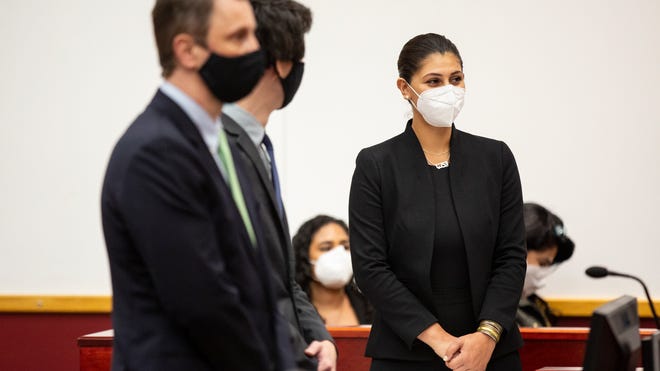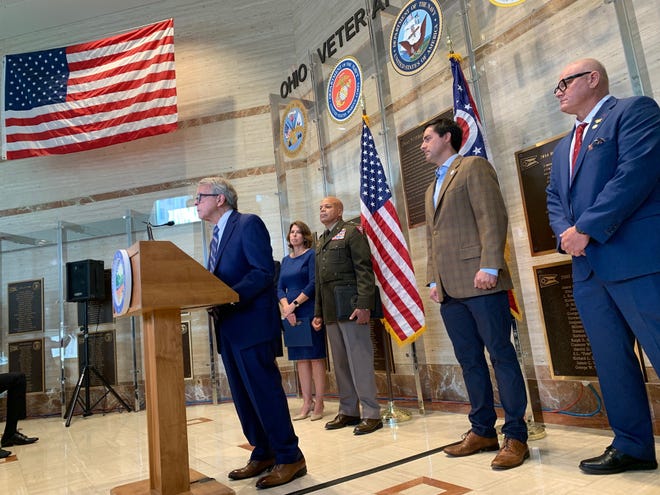
DES MOINES, Iowa — Andrea Sahouri, the Iowa journalist who was arrested as she reported on racial justice protests last summer, was found not guilty in a case that drew widespread condemnation from journalism and free press organizations.
Sahouri, a Des Moines Register reporter, was one of just a handful of journalists whose charges stemming from coverage of the protests in the wake of George Floyd's killing were not thrown out. More than 120 reporters were arrested or detained in 2020, but in most cases, prosecutors dropped the charges.
The Des Moines Register is owned by Gannett, the same parent company as USA TODAY.
Sahouri was acquitted on Wednesday of both misdemeanor charges against her, failure to disperse and interference with official acts. Both carried up to 30 days in jail.
Sahouri, who covers public safety in Des Moines, was on assignment May 31 at a protest that had gathered at Merle Hay Mall. Sahouri was with her then-boyfriend, Spenser Robnett, who was there for her safety while covering the demonstration.
Robnett was also acquitted of both charges.
The six-person jury spent less than two hours deliberating. After the verdict was read aloud, Sahouri and Robnett exchanged embraces with their attorneys and parents.
Judge Lawrence McLellan dismissed the court, telling prosecutors, "You tried a good case, and the jury has spoken."
Sahouri tweeted after the verdict, sharing two images of her in police custody and the caption, "Acquitted."
In a company email, Maribel Perez Wadsworth, president and publisher of USA TODAY who oversees the news division of Gannett, called the verdict "an important victory for the First Amendment and for journalism."
In the same email, Sahouri thanked not only her family, friends and colleagues, but also the support she's received from around the world.
“I’m thankful to the jury for doing the right thing. Their decision upholds freedom of the press and justice in our democracy,” Sahouri said.
In an interview with the Register, Sahouri said the charges and trial have been a heavy burden for the past 10 months.
"It’s really a tough feeling to go through this trial and have the State of Iowa trying to bring you down and trying to make you seem like you’re doing something wrong, when you’re really just doing your job," she said.
Sahouri testified Tuesday that she was a journalist on assignment determined to cover the historic protests unfolding in Des Moines. She said she immediately identified herself as a reporter when first approached by the officer who arrested her. But she was pepper sprayed and handcuffed after the officer told her, "That's not what I asked."
"It's important for journalists to be on the scene and document what's happening," Sahouri said during her testimony. "Protests erupted not just across the country but all over the world. I felt like I was playing a role in that. I know we are a small city, but I felt like I was playing a role in that."
Polk County Attorney Office John Sacrone told USA TODAY that his office believed they had sufficient evidence to establish guilt but the jury decided otherwise.
He dismissed any notion that Sahouri's prosecution was targeted due to her job as a journalist or at the Des Moines Register.
"No one is above the law. No one can violate the law, even her own boss said that," Sarcone said, referencing testimony from Register Executive Editor Carol Hunter. "This is not about reporting or anything else from my perspective," Sarcone said.
During trial, prosecutors attempted to cast the case narrowly, saying Sahouri's status as a journalist was not relevant to whether she committed the acts. They argued that Sahouri and Robnett heard dispersal orders an hour and half before their arrests, failed to leave the area and tried to pull away from the officer arresting Sahouri.

Testimony from the trial:Sahouri takes the stand in her own defense after jurors see bodycam video
The defense, however, said the orders before the arrests sent conflicting messages during a chaotic scene. When the arrests occurred, Sahouri, Robnett and another then-Des Moines Register reporter, who was with them but not arrested, were moving away from a crowd in which police had just deployed tear gas. And the claim that Sahouri and Robnett interfered with her arrest didn't add up to other testimony and photo and video from the scene, the defense argued.
The officer who arrested Sahouri did not activate his body camera, but another officer did capture video in the moments after her arrest. That video seen during trial showed Sahouri repeatedly telling officers she was on assignment as she pleaded for help with pepper spray in her eyes.
"This is my job. This is my job," Sahouri said. "I'm just doing my job. … I was sent here. … I'm a journalist."
According to the U.S. Press Freedom Tracker, Sahouri was one of just over a dozen reporters still facing charges for their arrests during the summer protests. In most cases, police departments and prosecutors' offices never fully pursued charges against a journalist covering a demonstration.
Within the USA TODAY Network, six journalists including Sahouri were arrested during the protests. However, only Sahouri faced charges. In the other cases, charges were dropped after it became clear the reporter was there to cover the scene, Wadsworth said.
David Ardia, a law professor and co-director at the University of North Carolina's Center for Media Law and Policy, told USA TODAY he was relieved but not surprised by the jury's verdict.
"When the facts were all presented to them, they clearly concluded that a journalist doing her job in this situation did not violate the law," Ardia said.
Still, going to trial in the first place "has a chilling effect" for journalists across the country, he said. Prosecutors have discretion about in which cases to pursue charges, and nothing presented during the trial gave any indication as to why the prosecutors continued after learning Sahouri was a journalist, Ardia said.
"The First Amendment has won a victory in this case, but this war is not over in terms of the public's need for journalists to cover the actions of law enforcement," Ardia said.
'Exceedingly rare':Iowa journalist faces charges from reporting on summer protests
Before the verdict, Sen. Chuck Grassley, R-Iowa, called reporters "kind of a policeman for our governmental system." Grassley said he was unfamiliar with the specifics of the case, and what Sahouri was doing while on the scene. But, "If she was there just covering the press and not ... violating any laws, just reporting, she ought to be covered by the First Amendment freedom of speech," he added.
Police officers testified, however, that Sahouri and Robnett were seen in body camera footage and a local TV station's coverage of the protest during and after the announcement of dispersal orders. Protesters were throwing rocks and water bottles while also breaking windows and damaging other property, police officers testified.
Des Moines police Lt. Chad Steffen said he told people to stand back while a squad car's public address system can be heard in the background of his bodycam footage telling people to "disperse" and also "protest peacefully."
Sahouri and Robnett said they never disobeyed police officers' orders and said they did not hear an order to disperse the area. Robnett testified that at one point, Sahouri spoke with a police officer on the scene after the dispersal order had been read who indicated to them that they could remain in the area.
Sahouri said she tried to remain at a distance from police to report on property damage, looting and people entering the mall. Katie Akin, the other Register reporter on the scene, said she met up with Sahouri and Robnett, and the three of them often moved away from police officers based on their instincts of what was happening rather than any orders from police.

The arrests occurred around 8 p.m. after police had deployed tear gas in a large group. Sahouri said the chemical agent scattered people. As they were moving away, Robnett was struck by a projectile he believed came from police.
As the three continued to move away, Sahouri said she turned around and saw a police officer running at her, so she stopped. "I didn't think it was a good idea to run from officers," she said.
Des Moines police officer Luke Wilson said that he came up on a group of people, deployed pepper spray and saw Sahouri was the only one who did not immediately leave.
That's when Wilson grabbed her and began the arrest, he said. When he had a hold of one of her arm, Wilson said she tried to pull her arm away. The officer said he was unsure why, indicating it was possible she was still feeling the effects of the pepper spray. Wilson also said Robnett tried to grab Sahouri from him, so he pepper-sprayed him.
Sahouri and Robnett denied interfering with Wilson. Robnett said he took one step toward Sahouri once he saw police approaching her, was immediately pepper-sprayed and fell to the ground. While on the ground, he recorded video of the incident, in which the group was heard identifying Sahouri as a reporter.
Wilson said he thought he had activated his body camera before the arrests. He pressed a button on the camera to save the recording about 15 minutes later, but when the camera appeared to start recording then, he said he was confused. By the time he realized the incident hadn't been saved, Wilson said it was too late to preserve the footage. In their instructions, jurors were allowed to consider whether they believed Wilson had intentionally not tried to persevere the footage and whether that would affect the case.
Akin photographed the moments after the arrests. Sgt. Natale Chiodo, whose bodycam footage captured the moments after, said when he arrived he encountered Akin but did not arrest her. "She just seemed very scared to me," he said. "She wasn't a threat. She wasn't disobeying our orders."

Before the trial, numerous media and journalism groups called for the charges against Sahouri to be dropped, including the Committee to Protect Journalists, the Reporters Committee for Freedom of the Press and students and staff from the Columbia University School of Journalism, where Sahouri earned a master's degree. The human rights organization Amnesty International also took up the cause.
Denise Bell, a researcher at Amnesty International USA, said they were heartened by the verdict of the trial. "Reporting at a protest as a working member of the media is not a crime, and treating it as one constitutes a human rights violation," Bell said in a statement.
In the company email, Wadsworth noted the irony that the defense also pointed out of prosecutors relying on another local TV news station's footage to make their case.
"Let that sink in. The video of one journalist at the scene was used in an effort to establish that another journalist was unlawfully at the same scene," Wadsworth wrote.
Hunter said in the statement they were grateful for the verdict.
"Newsgathering is a fundamental part of press freedom. Reporters need to be at protests as the public’s eyes and ears, to conduct interviews, take photos and witness for themselves the actions of protesters and law enforcement," Hunter wrote. "If reporters are arrested and hauled away from protests, that denies people the right to know what’s going on in their community.”
Contributing: Stephen Gruber-Miller, Des Moines Register
Morris reported from Des Moines and for the Des Moines Register. Miller reported from New York and for USA TODAY
Follow USA TODAY's Ryan Miller on Twitter @RyanW_Miller









